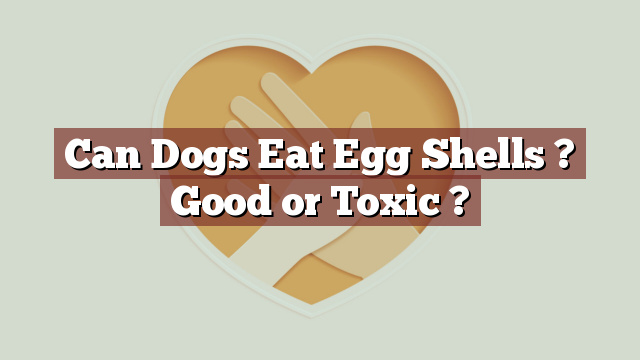Can Dogs Eat Egg Shells? Good or Toxic?
As responsible pet owners, it is crucial to be aware of what foods are safe for our beloved furry friends. Dogs have different dietary needs than humans, and some foods that are safe for us may be harmful to them. One such food item that often raises questions is egg shells. In this article, we will explore whether dogs can eat egg shells, their potential risks, and any benefits they may offer.
Nutritional Value of Egg Shells: Calcium-rich and Nutrient-dense
Egg shells are primarily composed of calcium carbonate, making them an excellent source of calcium. Calcium is an essential mineral for dogs, as it plays a vital role in maintaining healthy bones, teeth, muscles, and nerves. Moreover, egg shells also contain other essential nutrients such as magnesium, phosphorus, and protein.
Can Dogs Eat Egg Shells? Unlikely to be Toxic, but Caution is Advised
Dogs can eat egg shells, and they are unlikely to be toxic. The shells themselves are not harmful to dogs, as long as they are clean and free from any contaminants such as bacteria or pesticides. However, caution is still advised when feeding egg shells to your canine companions.
It is important to note that dogs have different digestive systems than humans. While egg shells are safe for dogs in moderation, they should not be the primary source of calcium in their diet. Dogs require a well-balanced and complete diet that meets all their nutritional needs. Therefore, it is essential to provide them with a balanced dog food that is specially formulated to meet their specific requirements.
Potential Risks or Benefits: Dental Health and Calcium Absorption
Including a small amount of egg shells in your dog’s diet may offer some potential benefits. The abrasive texture of egg shells can help promote dental health by gently scraping away plaque and tartar buildup on their teeth. Additionally, the calcium content in egg shells can aid in calcium absorption, especially for dogs with calcium deficiencies.
However, it is crucial to maintain an appropriate balance. Excessive consumption of egg shells may lead to an imbalance of calcium and phosphorus in a dog’s diet, which can be detrimental to their overall health. Therefore, it is best to consult with a veterinarian before incorporating egg shells into your dog’s diet.
What to Do if Your Dog Eats Egg Shells: Observe, Monitor, and Consult Vet
If your dog accidentally consumes egg shells, there is no immediate cause for concern. Observe your dog for any signs of distress or digestive issues such as vomiting or diarrhea. Monitor their behavior and bowel movements over the next 24-48 hours.
Should you notice any abnormal symptoms or if your dog has a pre-existing health condition, it is advisable to consult a veterinarian. They will be able to assess your dog’s specific situation and provide appropriate guidance.
Conclusion: Egg Shells Can be a Safe and Beneficial Addition to Dogs’ Diet
In conclusion, dogs can eat egg shells without significant toxic risks, but it is important to exercise caution. Egg shells can be a valuable source of calcium and other nutrients for dogs when used in moderation. However, it is crucial to remember that a well-balanced and complete diet tailored to a dog’s specific needs is essential.
If you choose to include egg shells in your dog’s diet, ensure they are clean and free from contaminants. As always, it is recommended to consult with a veterinarian before making any significant changes to your dog’s diet. By being knowledgeable about safe and beneficial foods, we can provide our furry companions with the best possible care and nutrition.
Thank you for investing your time in exploring [page_title] on Can-Eat.org. Our goal is to provide readers like you with thorough and reliable information about various dietary topics. Each article, including [page_title], stems from diligent research and a passion for understanding the nuances of our food choices. We believe that knowledge is a vital step towards making informed and healthy decisions. However, while "[page_title]" sheds light on its specific topic, it's crucial to remember that everyone's body reacts differently to foods and dietary changes. What might be beneficial for one person could have different effects on another. Before you consider integrating suggestions or insights from "[page_title]" into your diet, it's always wise to consult with a nutritionist or healthcare professional. Their specialized knowledge ensures that you're making choices best suited to your individual health needs. As you navigate [page_title], be mindful of potential allergies, intolerances, or unique dietary requirements you may have. No singular article can capture the vast diversity of human health, and individualized guidance is invaluable. The content provided in [page_title] serves as a general guide. It is not, by any means, a substitute for personalized medical or nutritional advice. Your health should always be the top priority, and professional guidance is the best path forward. In your journey towards a balanced and nutritious lifestyle, we hope that [page_title] serves as a helpful stepping stone. Remember, informed decisions lead to healthier outcomes. Thank you for trusting Can-Eat.org. Continue exploring, learning, and prioritizing your health. Cheers to a well-informed and healthier future!

